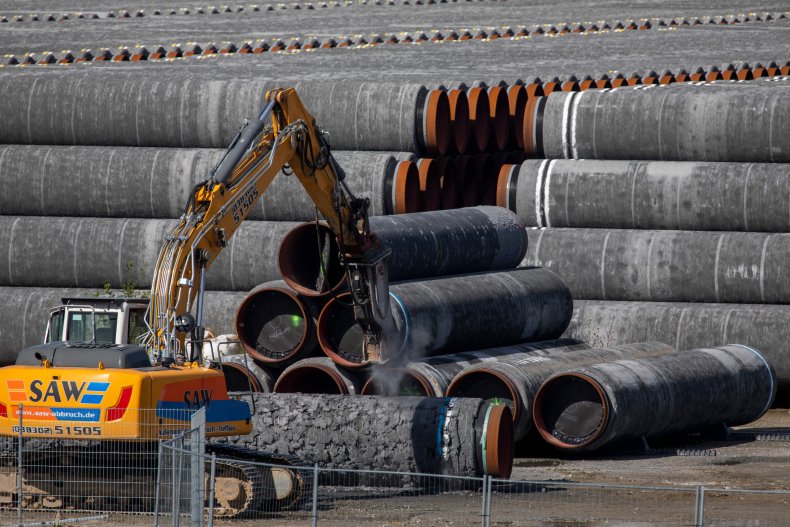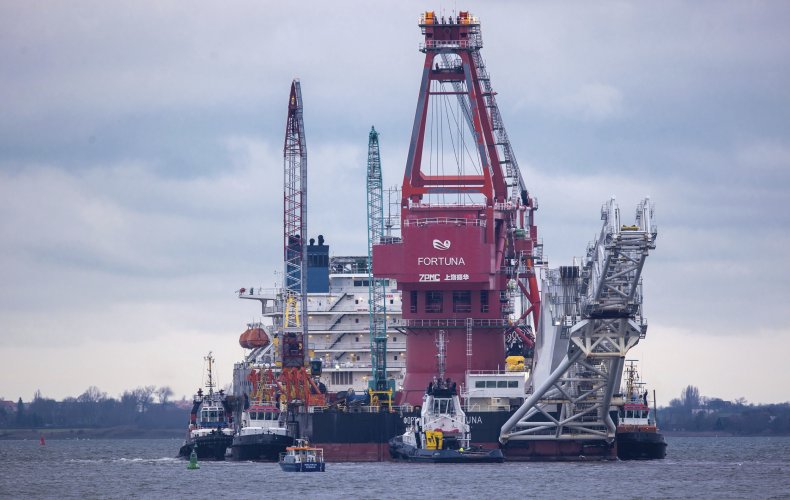[ad_1]
The Biden administration will place sanctions on Russian ships and companies for their role in the construction of a controversial European pipeline project while waiving penalties on a German company, according to the Associated Press.
Secretary of State Antony Blinken and Russian Foreign Minister Sergey Lavrov were to meet in Iceland later on Wednesday, which is when announcement of the sanctions is expected from the Biden administration.
The meeting is expected to be tense, as tensions are already high between Washington and Moscow.
For more reporting from the Associated Press, see below:

Odd Anderson/Getty Images
The decision to spare a German company comes as President Joe Biden looks to mend relations with a key ally that were unsettled during the Trump administration. But it will anger U.S. lawmakers and other critics of the Nord Stream 2 pipeline who believe the only chance to stop its completion is to go after the company overseeing the project and its top executive.
The U.S. has long opposed the project, which would bring natural gas from Russia to Germany. It argues the pipeline threatens European energy security and poses risks to Ukraine and Poland, which are both bypassed by the project.
Congressional aides said the administration would impose sanctions on eight Russian ships and companies involved. The German company, Nord Stream 2 AG, and its German chief executive will also be identified as violating U.S. law. But Biden is using presidential authority to waive sanctions on them under a national interest exemption in the legislation, according to the aides and German Foreign Minister Heiko Maas.
The aides spoke on condition of anonymity because the administration has yet to transmit a periodic compliance report to Congress that will identify the targets of the sanctions.
Maas, who spoke with Blinken by phone about the issue on Tuesday, praised the decision.
“We perceive this to be a constructive step that we will gladly continue to discuss with our partners in Washington,” Maas told reporters in Berlin on Wednesday.
German Chancellor Angela Merkel has defended the project, noting that Russian gas already flows freely into Europe along other routes, including the existing Nord Stream 1 pipeline under the Baltic Sea to Germany.
Nord Stream 2 is owned by Russian state company Gazprom, with investment from several European companies. Domestic critics in Germany have argued the pipeline should be abandoned because of Russia’s treatment of opposition leader Alexey Navalny.
Maas said Germany would discuss with U.S. officials what further steps are necessary to ensure that the waiver remains in place when the next report is due in three months.
“We understand the decision that was made in Washington to be one that takes into consideration the really extraordinarily good relations that have been established with the Biden administration,” he said. “And we naturally also understand it to indicate that Germany [is seen as] an important partner for the United States on which one counts in the future.”
In choosing not to hit Germany with sanctions and focus on Russian companies, the administration has exacerbated a battle with lawmakers, some of whom have now placed holds on the nominations of several of the administration’s picks for senior State Department positions and are threatening to block others.
Nord Stream 2 has attracted bipartisan opposition on Capitol Hill, with administration critics such as Senator Ted Cruz, R-Texas, and Representative Michael McCaul, R-Texas, joining Democrats such as New Jersey Senator Robert Menendez, Delaware Senator Chris Coons and New Hampshire Senator Jeanne Shaheen.
In Germany, the two leading contenders to succeed Merkel after the country’s September 26 general election have contrasting positions on the pipeline. The project is 95 percent complete, although construction has not yet begun on its final leg in German waters.
The candidate of the environmentalist Greens party, Annalena Baerbock, said recently that she would have withdrawn support for Nord Stream 2.
Armin Laschet, the candidate of Merkel’s center-right party, backs Germany’s existing stance.
“I think the German government’s position is right, that it has granted the project all its permits,” Laschet said Wednesday at a discussion event on foreign policy. “‘It can’t happen’ isn’t a foreign policy response, because it is happening,” he said.

Jens Buettner/Associated Press
[ad_2]
Source link